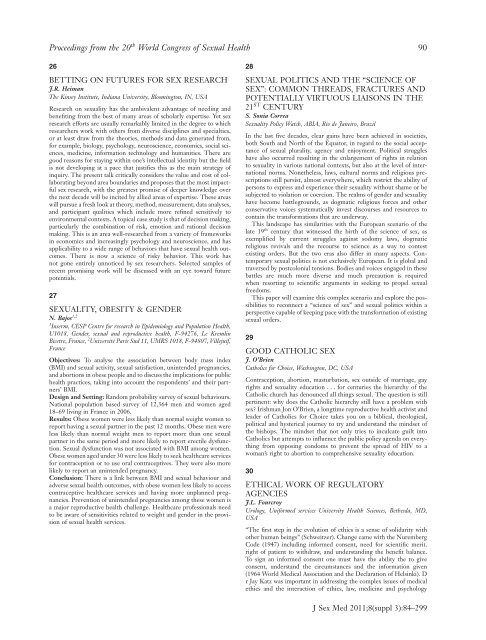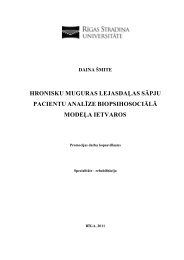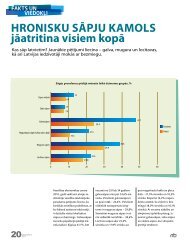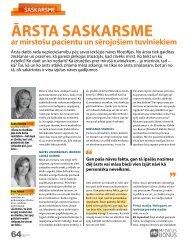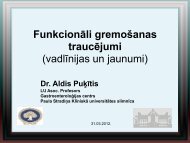89Proceedings from the 20 th World Congress of Sexual Health22WHO SUPPORT TO COUNTRIES INIMPROVING SEXUAL HEALTHG.L. LazdaneSexual and Reproductive Health Programme, WHO Regional Office forEurope, Copenhagen, DenmarkWHA in 2004 adopted the WHO Global Reproductive Health (RH)Strategy that includes “promoting sexual health (SH)” as one of its coreaspects. To assist Member States in evaluating progress towards theattainment of international RH goals a framework for implementingthe Strategy was published in which detailed actions and process andoutcome indicators are suggested for implementation at programmelevels (http://www.who.int/reproductivehealth/publications/general/RHR_06.3/en/index.html). In 2010 WHO launched a holistic, multisectoraland interdisciplinary approach to planning and services deliveryfor sexual health entitled “Developing sexual health programmes:A framework for action” (http://www.who.int/reproductivehealth/publications/sexual_health/rhr_hrp_10_22/en/index.html). A detailedexplanation of possible SH interventions covers the following areas:laws, policies and human rights; education; society and culture; economics;and health systems. The WHO Regional Office for Europe incollaboration with the Ministry of Health, Social Policy and Equity ofSpain, the IPPF EN and BzGA, a WHO collaborating centre inCologne, carried out an analysis of the SH of adolescents, older people,migrant populations, people living with HIV and people with disabilities,that was discussed during a meeting of national counterpartsfrom more than 30 countries and international partners working inthe area of SH. “Standards for sexuality education in Europe: A frameworkfor policy makers, educational and health authorities and specialists”was presented and the standards have already been adapted andadopted by several countries of the WHO European Region. Furtherpossible assistance from WHO to improve sexual health will be basedon the requests of its Member States and the governing bodies ofWHO.23“HOMOSEXUALITIES” AND “HOMOPHOBIAS”IN LATIN AMERICA: BALANCE ANDPERSPECTIVESJ. Barrientos DelgadoPsychology School, Universidad Catolica del Norte, Antofagasta, ChileLatin American countries are highly patriarchal and are characterizedby a machismo culture of male dominance and a rigid characterizationof masculinity. Different studies have shown that significant changesare taking place in sexual and gender values in Latin American countries,but attitudes towards the LGTB population have changed moreslowly. This presentation formulates a synthesis of the uses and conceptsof “homosexuality” and “homophobia” in Latin America, particularlyin the last three decades, and demonstrates that the stigmaand discrimination towards LGTB populations persist in the region.The presentation shows the evolution of attitudes towards gay menand lesbians in different Latin American countries, using data fromvarious sources (World Values Survey, Gay Pride studies and specificstudies in each country). In addition, it provides a synthetic analysis ofthe legal framework existing in the countries of the region in relationto LGTB population, showing the problems in different areas (forexample: same sex-unions, same-sex marriage and anti-discriminationlaws).Next, it makes a critical review of social research regarding “homosexualities”in the region (and the roles that the LGBT movement,social sciences, universities and sexologists have played in it). It alsodescribes the use of research tools to establish public policies relatedto sexual diversity on a regional basis. Only in the 80s, when HIV/AIDS appeared in the region, was this theme considered a legitimateline of scientific research. LGTB organizations helped supply effortand resources to this task. The public policies didn’t do anything,except help to HIV-related problems. Only in the last few years havesome countries like Brazil and Argentina made important changes toimprove the social situation of the LGTB population (anti-discriminationlaws and efforts to fight towards discrimination, and same-sexmarriage in Argentina) This presentation also deals with the mainregional advancements and retrogressions concerning homophobiaand its effects on the LGBT population, particularly those referringto quality of life and welfare.Finally it analyzes the main challenges of the next few years and itanalyzes the social, cultural, and political conditions of the region thatmay or may not influence the amount of respect for differences andthe role of sexology and sexologists in this area.24THE MIND AND THE GENITALSM.P. McCabePsychology, Deakin University, Burwood, VIC, AustraliaResearch has clearly indicated that biological, psychological, social andcultural factors impact on sexual response. This paper will examine thecontribution of psychological factors to the development of sexualresponse in both men and women. Both long term and current psychologicalfactors will be considered, as well as differences in theresponses of men and women to the factors. I will also discuss theextent to which it is possible to link particular psychological variablesto particular problems in the response cycle, or whether the factorshave a more general association with sexual dysfunction. Examples ofvariables that will be discussed are sex-specific variables (e.g., sex guiltor shame, sexual anxiety, and performance anxiety), mood variables(e.g., depression, anxiety, stress) and responses to the relationship (e.g.,relationship satisfaction, conflict, communication). The way in whichpsychological variables can enhance or impede sexual functioning willbe discussed.25NEEDS OF ‘MOST-AT-RISK POPULATIONS’(MARP) INCLUDING SEXUAL MINORITIESVERSUS POLITICS OF PROTECTIONS.I. KhanSocial and Behavioral Sciences Unit, Public Health Sciences Division,ICDDR,B, Dhaka, BangladeshBackground: Under the trademark of targeted HIV interventions,social and sexual needs of MARP including sexual and genderedminorities are quietly buried. Studies mostly measure behavioral risksand explore ‘superficial’ reasons for not practicing safer behaviorsresulting in questionable outcome of HIV interventions.Methods: Data of this article came from various studies conducted inBangladesh since early 1990s. This article has described diverse crisisencountered by MARP inclduing gendered and sexual minorities, andargued that unless structural interventions are implemented, HIV preventiongoal remains unachieved.Findings: Since early 1990s, millions of dollars are spent for purchasingcondoms/lubricants and safer injection equipments but little hasbeen spent to improve water and sanitation of brothels; millions arespent for operating drop-in-centers and STI treatment, but limited hasbeen done to strengthen health systems to be inclusive. Any diverseform of gender and sexualities challenging bi-genderism or heteronormativityare condemned by political and religious leaders, whereassignificant funds already have been spent in the name of advocacymeetings. Economic, social and sexual well-being of sexual minoritiesare entrapped into politics of STI/HIV transmission.Conclusion: In the context of multi-dimensional social and structuralcrisis, ‘wrapping’ genitals with condoms/lubricants has no meaning tovulnerable people. Multi-million dollars’ interventions in a low HIVsetting cannot be confined to condom promotion. Individual riskreduction model must be accompanied with community and socialdevelopment initiatives with multi-sectoral involvement. We shouldnot forget that ‘genital safety’ has no meaning if life of the vulnerablepeople remains unsafe.J Sex Med 2011;8(suppl 3):84–299jsm_2325.indd 895/20/2011 8:18:12 PM
Proceedings from the 20 th World Congress of Sexual Health 9026BETTING ON FUTURES FOR SEX RESEARCHJ.R. HeimanThe Kinsey Institute, Indiana University, Bloomington, IN, USAResearch on sexuality has the ambivalent advantage of needing andbenefiting from the best of many areas of scholarly expertise. Yet sexresearch efforts are usually remarkably limited in the degree to whichresearchers work with others from diverse disciplines and specialties,or at least draw from the theories, methods and data generated from,for example, biology, psychology, neuroscience, economics, social sciences,medicine, information technology and humanities. There aregood reasons for staying within one’s intellectual identity but the fieldis not developing at a pace that justifies this as the main strategy ofinquiry. The present talk critically considers the value and cost of collaboratingbeyond area boundaries and proposes that the most impactfulsex research, with the greatest promise of deeper knowledge overthe next decade will be incited by allied areas of expertise. These areaswill pursue a fresh look at theory, method, measurement, data analyses,and participant qualities which include more refined sensitively toenvironmental contexts. A topical case study is that of decision making,particularly the combination of risk, emotion and rational decisionmaking. This is an area well-researched from a variety of frameworksin economics and increasingly psychology and neuroscience, and hasapplicability to a wide range of behaviors that have sexual health outcomes.There is now a science of risky behavior. This work hasnot gone entirely unnoticed by sex researchers. Selected samples ofrecent promising work will be discussed with an eye toward futurepotentials.27SEXUALITY, OBESITY & GENDERN. Bajos 1,21 Inserm, CESP Centre for research in Epidemiology and Population Health,U1018, Gender, sexual and reproductive health, F-94276, Le KremlinBicetre, France, 2 Université Paris Sud 11, UMRS 1018, F-94807, Villejuif,FranceObjectives: To analyse the association between body mass index(BMI) and sexual activity, sexual satisfaction, unintended pregnancies,and abortions in obese people and to discuss the implications for publichealth practices, taking into account the respondents’ and their partners’BMI.Design and Setting: Random probability survey of sexual behaviours.National population based survey of 12,364 men and women aged18–69 living in France in 2006.Results: Obese women were less likely than normal weight women toreport having a sexual partner in the past 12 months. Obese men wereless likely than normal weight men to report more than one sexualpartner in the same period and more likely to report erectile dysfunction.Sexual dysfunction was not associated with BMI among women.Obese women aged under 30 were less likely to seek healthcare servicesfor contraception or to use oral contraceptives. They were also morelikely to report an unintended pregnancy.Conclusion: There is a link between BMI and sexual behaviour andadverse sexual health outcomes, with obese women less likely to accesscontraceptive healthcare services and having more unplanned pregnancies.Prevention of unintended pregnancies among these women isa major reproductive health challenge. Healthcare professionals needto be aware of sensitivities related to weight and gender in the provisionof sexual health services.28SEXUAL POLITICS AND THE “SCIENCE OFSEX”: COMMON THREADS, FRACTURES ANDPOTENTIALLY VIRTUOUS LIAISONS IN THE21 ST CENTURYS. Sonia CorreaSexuality Policy Watch, ABIA, Rio de Janeiro, BrazilIn the last five decades, clear gains have been achieved in societies,both South and North of the Equator, in regard to the social acceptanceof sexual plurality, agency and enjoyment. Political struggleshave also occurred resulting in the enlargement of rights in relationto sexuality in various national contexts, but also at the level of internationalnorms. Nonetheless, laws, cultural norms and religious prescriptionsstill persist, almost everywhere, which restrict the ability ofpersons to express and experience their sexuality without shame or besubjected to violation or coercion. The realms of gender and sexualityhave become battlegrounds, as dogmatic religious forces and otherconservative voices systematically invest discourses and resources tocontain the transformations that are underway.This landscape has similarities with the European scenario of thelate 19 th century that witnessed the birth of the science of sex, asexemplified by current struggles against sodomy laws, dogmaticreligious revivals and the recourse to science as a way to contestexisting orders. But the two eras also differ in many aspects. Contemporarysexual politics is not exclusively European. It is global andtraversed by postcolonial tensions. Bodies and voices engaged in thesebattles are much more diverse and much precaution is requiredwhen resorting to scientific arguments in seeking to propel sexualfreedoms.This paper will examine this complex scenario and explore the possibilitiesto reconnect a “science of sex” and sexual politics within aperspective capable of keeping pace with the transformation of existingsexual orders.29GOOD CATHOLIC SEXJ. O’BrienCatholics for Choice, Washington, DC, USAContraception, abortion, masturbation, sex outside of marriage, gayrights and sexuality education . . . for centuries the hierarchy of theCatholic church has denounced all things sexual. The question is stillpertinent: why does the Catholic hierarchy still have a problem withsex? Irishman Jon O’Brien, a longtime reproductive health activist andleader of Catholics for Choice takes you on a biblical, theological,political and hysterical journey to try and understand the mindset ofthe bishops. The mindset that not only tries to inculcate guilt intoCatholics but attempts to influence the public policy agenda on everythingfrom opposing condoms to prevent the spread of HIV to awoman’s right to abortion to comprehensive sexuality education.30ETHICAL WORK OF REGULATORYAGENCIESJ.L. FourcroyUrology, Uniformed services University Health Sciences, Bethesda, MD,USA“The first step in the evolution of ethics is a sense of solidarity withother human beings” (Schweitzer). Change came with the NurembergCode (1947) including informed consent, need for scientific merit.right of patient to withdraw, and understanding the benefit balance.To sign an informed consent one must have the ability the to giveconsent, understand the circumstances and the information given(1964 World Medical Association and the Declaration of Helsinki). Dr Jay Katz was important in addressing the complex issues of medicalethics and the interaction of ethics, law, medicine and psychologyJ Sex Med 2011;8(suppl 3):84–299jsm_2325.indd 905/20/2011 8:18:12 PM
- Page 1 and 2: ALE & FEMALE SEXUAL FUNCTION & DYSF
- Page 3 and 4: INTERNATIONAL SOCIETY FOR SEXUAL ME
- Page 5 and 6: The Journal of Sexual Medicine, (IS
- Page 7 and 8: 80Message from Rosemary Coates WAS
- Page 9 and 10: 82Scientific Research at the World
- Page 11: 84Proceedings from the 20 th WORLD
- Page 14 and 15: 87Proceedings from the 20 th World
- Page 18 and 19: 91Proceedings from the 20 th World
- Page 20 and 21: 93Proceedings from the 20 th World
- Page 22 and 23: 95Proceedings from the 20 th World
- Page 24 and 25: 97Proceedings from the 20 th World
- Page 26 and 27: 99Proceedings from the 20 th World
- Page 28 and 29: 101Proceedings from the 20 th World
- Page 30 and 31: 103Proceedings from the 20 th World
- Page 32 and 33: 105Proceedings from the 20 th World
- Page 34 and 35: 107Proceedings from the 20 th World
- Page 36 and 37: 109Proceedings from the 20 th World
- Page 38 and 39: 111Proceedings from the 20 th World
- Page 40 and 41: 113Proceedings from the 20 th World
- Page 42 and 43: 115Proceedings from the 20 th World
- Page 44 and 45: 117Proceedings from the 20 th World
- Page 46 and 47: 119Proceedings from the 20 th World
- Page 48 and 49: 121Proceedings from the 20 th World
- Page 50 and 51: 123Proceedings from the 20 th World
- Page 52 and 53: 125Proceedings from the 20 th World
- Page 54 and 55: 127Proceedings from the 20 th World
- Page 56 and 57: 129Proceedings from the 20 th World
- Page 58 and 59: 131Proceedings from the 20 th World
- Page 60 and 61: 133Proceedings from the 20 th World
- Page 62 and 63: 135Proceedings from the 20 th World
- Page 64 and 65: 137Proceedings from the 20 th World
- Page 66 and 67:
139Proceedings from the 20 th World
- Page 68 and 69:
141Proceedings from the 20 th World
- Page 70 and 71:
143Proceedings from the 20 th World
- Page 72 and 73:
145Proceedings from the 20 th World
- Page 74 and 75:
147Proceedings from the 20 th World
- Page 76 and 77:
149Proceedings from the 20 th World
- Page 78 and 79:
151Proceedings from the 20 th World
- Page 80 and 81:
153Proceedings from the 20 th World
- Page 82 and 83:
155Proceedings from the 20 th World
- Page 84 and 85:
157Proceedings from the 20 th World
- Page 86 and 87:
159Proceedings from the 20 th World
- Page 88 and 89:
161Proceedings from the 20 th World
- Page 90 and 91:
163Proceedings from the 20 th World
- Page 92 and 93:
165Proceedings from the 20 th World
- Page 94 and 95:
167Proceedings from the 20 th World
- Page 96 and 97:
169Proceedings from the 20 th World
- Page 98 and 99:
171Proceedings from the 20 th World
- Page 100 and 101:
173Proceedings from the 20 th World
- Page 102 and 103:
175Proceedings from the 20 th World
- Page 104 and 105:
177Proceedings from the 20 th World
- Page 106 and 107:
179Proceedings from the 20 th World
- Page 108 and 109:
181Proceedings from the 20 th World
- Page 110 and 111:
183Proceedings from the 20 th World
- Page 112 and 113:
185Proceedings from the 20 th World
- Page 114 and 115:
187Proceedings from the 20 th World
- Page 116 and 117:
189Proceedings from the 20 th World
- Page 118 and 119:
191Proceedings from the 20 th World
- Page 120 and 121:
193Proceedings from the 20 th World
- Page 122 and 123:
195Proceedings from the 20 th World
- Page 124 and 125:
197Proceedings from the 20 th World
- Page 126 and 127:
199Proceedings from the 20 th World
- Page 128 and 129:
201Proceedings from the 20 th World
- Page 130 and 131:
203Proceedings from the 20 th World
- Page 132 and 133:
205Proceedings from the 20 th World
- Page 134 and 135:
207Proceedings from the 20 th World
- Page 136 and 137:
209Proceedings from the 20 th World
- Page 138 and 139:
211Proceedings from the 20 th World
- Page 140 and 141:
213Proceedings from the 20 th World
- Page 142 and 143:
215Proceedings from the 20 th World
- Page 144 and 145:
217Proceedings from the 20 th World
- Page 146 and 147:
219Proceedings from the 20 th World
- Page 148 and 149:
221Proceedings from the 20 th World
- Page 150 and 151:
223Proceedings from the 20 th World
- Page 152 and 153:
225Proceedings from the 20 th World
- Page 154 and 155:
227Proceedings from the 20 th World
- Page 156 and 157:
229Proceedings from the 20 th World
- Page 158 and 159:
231Proceedings from the 20 th World
- Page 160 and 161:
233Proceedings from the 20 th World
- Page 162 and 163:
235Proceedings from the 20 th World
- Page 164 and 165:
237Proceedings from the 20 th World
- Page 166 and 167:
239Proceedings from the 20 th World
- Page 168 and 169:
241Proceedings from the 20 th World
- Page 170 and 171:
243Proceedings from the 20 th World
- Page 172 and 173:
245Proceedings from the 20 th World
- Page 174 and 175:
247Proceedings from the 20 th World
- Page 176 and 177:
249Proceedings from the 20 th World
- Page 178 and 179:
251Proceedings from the 20 th World
- Page 180 and 181:
253Proceedings from the 20 th World
- Page 182 and 183:
255Proceedings from the 20 th World
- Page 184 and 185:
257Proceedings from the 20 th World
- Page 186 and 187:
259Proceedings from the 20 th World
- Page 188 and 189:
261Proceedings from the 20 th World
- Page 190 and 191:
263Proceedings from the 20 th World
- Page 192 and 193:
265Proceedings from the 20 th World
- Page 194 and 195:
267Proceedings from the 20 th World
- Page 196 and 197:
269Proceedings from the 20 th World
- Page 198 and 199:
271Proceedings from the 20 th World
- Page 200 and 201:
273Proceedings from the 20 th World
- Page 202 and 203:
275Proceedings from the 20 th World
- Page 204 and 205:
277Proceedings from the 20 th World
- Page 206 and 207:
279Proceedings from the 20 th World
- Page 208 and 209:
281Proceedings from the 20 th World
- Page 210 and 211:
283Proceedings from the 20 th World
- Page 212 and 213:
285Proceedings from the 20 th World
- Page 214 and 215:
287Proceedings from the 20 th World
- Page 216 and 217:
289Proceedings from the 20 th World
- Page 218 and 219:
291Proceedings from the 20 th World
- Page 220 and 221:
293Proceedings from the 20 th World
- Page 222 and 223:
295Proceedings from the 20 th World
- Page 224 and 225:
297Proceedings from the 20 th World
- Page 226:
299Proceedings from the 20 th World


